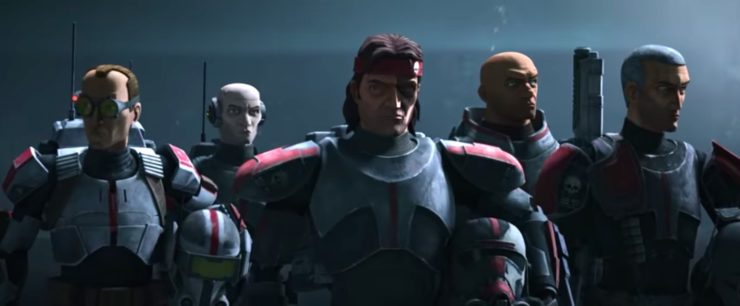Of course they’ll be back; no one can keep Clone Force 99 down for long. Disney announced today that Star Wars: The Bad Batch has been renewed for a second season—one that will air next year.
The Bad Batch follows a group of special forces clones—all voiced by the incomparable Dee Bradley Baker—who were introduced in the final season of The Clone Wars. The new show is set in the immediate aftermath of Order 66, which doesn’t affect most of the members of Clone Force 99. But it does change their world drastically, leaving them on the run from an Empire that would like to wipe them out.
The series introduces a new clone, Omega (Michelle Ang), a young girl who doesn’t seem to have a lot in common with her clone family on the surface. But she does seem to have a notable tendency to pick up new skills quickly, and to assess and adapt to new situations. Her story has yet to be fully explored, as the series has spent much of its first season keeping the clones busy with missions for Cid (Rhea Perlman) and bringing them into contact with characters from other series (notably Captain Rex and a young Hera Syndulla).
The Bad Batch is executive produced by The Clone Wars‘ Dave Filoni along with a team of experienced Star Wars folks: Athena Portillo (The Clone Wars, Rebels), supervising director Brad Rau (Rebels, Resistance), head writer Jennifer Corbett (Resistance), and Carrie Beck (The Mandalorian, Rebels).
Star Wars: @TheBadBatch will return for a second season in 2022. Prepare for the two part finale of season one starting tomorrow, only on @DisneyPlus. #TheBadBatch pic.twitter.com/TOs5Lh34bT
— Star Wars (@starwars) August 5, 2021
The Bad Batch ends its first season next week with part one of the season finale on Disney+, and will return in 2022.











Clone Wars got so darn good in the last few seasons that I hated to see it go. Bad Batch has picked up the story quite well, with a fun core cast. Plus, they are exploring the earlier days of the Empire, which is a fascinating time. I’m looking forward to seeing more.
The tag line for the first episode should’ve been: “Order 66 turns Clone Force 99 upside-down!”
I didn’t care for the Bad Batch much in their first appearance, but the show’s turning out reasonably well. Although it does have its issues. It’s a bit too small-universe, with the Batch constantly running into important characters from other shows, including both Caleb Dume and Hera Syndulla separately within a few months of each other. Also, didn’t anyone at Lucasfilm notice that The Mandalorian already did the bit about a stoic warrior type teaming up with a cute kid being pursued by bounty hunters?
The exploration of the formative days of the Empire is the part that’s working best for me.
@2 I like that tag line!
One thing that gave me cognitive dissonance was the bit in episode 5 where the Batch were adamant that slavery was bad and the Republic had outlawed it. I mean, the Clones were literally created for the exclusive purpose of being expendable servants of the Republic, and the Kaminoans certainly treat them like property, so how are they not slaves?
Also in that episode, when they saved that cute baby Rancor and got friendly with it before turning it over to Bib Fortuna… was that implicitly the same Rancor Luke would kill 23 years later in ROTJ? The one that Jabba fed his slave girls to? Now, there’s some serious cognitive dissonance.
The rancor that Luke killed was a male named Pateesa, if that helps!
Not to get too dire, but not not only were the clones slaves, they were child soldiers. The oldest were twelve or thirteen.
@5/Sophia: Of course somebody already named that Rancor and no doubt told his entire life story. I should’ve known.
Still, it seems likely that this other Rancor would’ve been fed its share of Jabba’s prisoners and slaves once it grew up. So the cognitive dissonance of treating it as a cute rescue animal remains.
@@.-@ I think you’re right, but I really doubt the clones see it that way.
The clones remind me of the azi from C.J. Cherryh’s Alliance-Union universe. They’re genetically engineered clones grown in artificial wombs subjected to extensive psychological conditioning as education. Societies without them are generally horrified of the idea, and there are active abolitionist movments within the polity that created them. But they don’t see anything wrong with themselves. One response I think I remember from an azi, when a baseline human questioned the nature of the azi’s existence, “I know why I was made, can you say the same?”